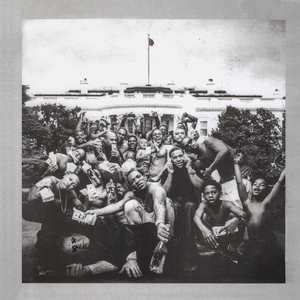In this article and series, I will be going song through song on “To Pimp A Butterfly” and revealing the lasting meaning shed by each track. This renowned album by Kendrick Lamar Duckworth, a musical virtuoso and renowned storyteller, offers deeper layers of meaning with each listen. As a Pulitzer Prize winner, Kendrick’s work is groundbreaking, with each track rich in both obscurity and lyrical depth. Through multiple listens, the album’s significance becomes more apparent, with its undeniable lasting contribution to hip-hop history obvious. In this article, I’ll dissect the first two songs of “To Pimp A Butterfly,” exploring their vital lyrics and how they contribute to the album’s complex and overarching theme.

Wesley’s Theory:
This song is filled with funk and jazz, gifting your ears with new complex sounds. After a beginning sample, the first song of the album begins with George Clinton saying “When the four corners of this cocoon collide, You’ll slip through the cracks hoping that you’ll survive; Gather your wind, Are you really who they idolize?, To pimp a butterfly.” My interpretation of these first lyrics is that the “higher ups” in society and specifically in the USA often pimp out young, successful hip-hop artists, targeting African Americans. Kendrick is utilizing the metaphor to examine the music industry’s use of him and other artists alike.
Uncle Sam and Capitalism:
Moving towards the second verse, Kendrick makes use of “Uncle Sam” saying “What you want you? A house or a car? Forty acres and a mule, a piano, a guitar?” Kendrick here utilizes Uncle Sam to represent the US and capitalism in America as a whole. Kendrick is specifically referencing the tempting nature of materialistic things that swallow up prosperous African American’s newfound wealth. Here, Uncle Sam is targeting this culture. He’s attempting to “pimp them out” to essentially fool them into squandering their wealth on the elites and the significantly wealthy.

Uncle Sam continues, saying “And when you hit the White House do you, but remember you ain’t pass economics in school; And everything you buy, taxes will deny, I’ll Wesley Snipes your ass before 35.” This is a verse hinting at the title. Moreover, Wesley Snipes is an African American actor infamous for his tax evasion. This verse explores a larger issue in Kendrick’s song: even though African Americans see success, their general lack of education and difficult living circumstances contribute to their downfall.

Connection To Our Dark Past:
Moving back to the previous lines, “What you want you? A house or a car? Forty acres and a mule, a piano, a guitar?” Kendrick is making an ingenious connection to old promises made to slaves. This refers to a post-Civil War military order that pledged forty acres of land and a mule to freed slaves and their families. However, this promise was never fulfilled. It aligns with the song’s theme of the US’s habit of concealing its mistakes and corruption through falsehoods and deceit.
Kendrick continues using capitalistic Uncle Sam throughout this song and the entire album. Uncle Sam on the surface may seem to be representing a country full of freedom and opportunity, but underlying it are the unfortunate situations of many, making it practically impossible to break out of poverty and “the hood.” Even when people, like Wesley Snipes, do make it out, they are eventually burdened by their trouble later on. In this case, he ends up in financial trouble largely due to his poor education and living conditions in his childhood.
This brief introduction to this song showcases Kendrick’s meticulous and outstanding lyricism and broader use of ideas. Kendrick begins the album with a funky, jazzy, and catchy song that hooks the observational listener immediately.
For Free? (Interlude):

This song incorporates funky jazz music throughout, and starts off with a saxophone playing by Terrance Martin. The fast tempo and conversation between Kendrick and his girlfriend in this song help form the overarching message of this track.
Verse one:
The song begins with the lines “You looking at me, like it ain’t a receipt, like I never made ends meet, eating your leftovers and meat.” These lines represent that kids like him have sat and watched Americans living lavish lives while people like him have only gotten the scraps. Furthermore, Kendrick highlights the judgmental and harsh critics who react with shock to his appearance and speech. This contrast is emphasized by what he purchases, hence the use of the word “receipt.”
Verse two:

Moving to the next important lines, Kendrick when talking to his girlfriend says “Pity the fool that made the pretty in you prosper.” This is another reference to the US. Here, Kendrick is saying that there is this aura around America where people think it is perfect and flourishing. He is pointing out how these same people ignore the atrocities and suppression going on within this country’s borders.
Verse three:
Transitioning to the final lyrics I’ll analyze in this eloquently crafted interlude, Kendrick expresses, “Matter of fact, see our friendship based on business. Pension, more pension, you’re pinchin’ my percents.” Here, Kendrick references the music industry’s ill use of him. Additionally, Kendrick highlights how the industry views him not as an artist, but merely as a means to generate profit. Furthermore, he exposes the disingenuous nature of corporations and businesses in America. Ultimately, they exploit artists for financial gain until they discard them for the next profitable option.
Goodbye… For Now:
To consider this article as a sample of the mastery and musicality behind his songs would be a great understatement. Each song of his is like a collection of poems that just happen to sound amazing sung and rapped together. Kendrick Lamar is an innovator in hip-hop, breaking away from the typical mold. He raps about real problems and emotions faced by society today. Moreover, if you haven’t already, I encourage you to dive deeper into his music. Even if you’ve listened before, you’ll be in awe of his lyricism and creativity. Also, be ready for part two of this “series” because we are just getting started. Thanks for reading.
Tune into The Roundup for “Part Two: To Pimp a Butterfly – Kendrick Lamar!”
